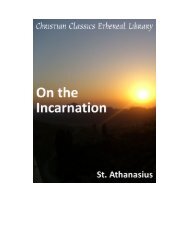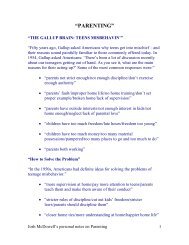Pdf Copy of Orthodoxy, by G.K. Chesterton - Christ United Methodist ...
Pdf Copy of Orthodoxy, by G.K. Chesterton - Christ United Methodist ...
Pdf Copy of Orthodoxy, by G.K. Chesterton - Christ United Methodist ...
You also want an ePaper? Increase the reach of your titles
YUMPU automatically turns print PDFs into web optimized ePapers that Google loves.
9/ 27/ 12 The Pr oject G ut enber g eBook <strong>of</strong> O r t hodoxy, G . K. Chest er t on<br />
www. gut enber g. or g/ f iles/ 16769/ 16769- h/ 16769- h. ht m<br />
really were wrong in so far as they suggested that men had ever aimed at order or ethics<br />
directly <strong>by</strong> a conscious exchange <strong>of</strong> interests. Morality did not begin <strong>by</strong> one man saying to<br />
another, "I will not hit you if you do not hit me"; there is no trace <strong>of</strong> such a transaction. There<br />
is a trace <strong>of</strong> both men having said, "We must not hit each other in the holy place." They<br />
gained their morality <strong>by</strong> guarding their religion. They did not cultivate courage. They fought<br />
for the shrine, and found they had become courageous. They did not cultivate cleanliness.<br />
They purified themselves for the altar, and found that they were clean. The history <strong>of</strong> the<br />
Jews is the only early document known to most Englishmen, and the facts can be judged<br />
sufficiently from that. The Ten Commandments which have been found substantially common<br />
to mankind were merely military commands; a code <strong>of</strong> regimental orders, issued to protect a<br />
certain ark across a certain desert. Anarchy was evil because it endangered the sanctity.<br />
And only when they made a holy day for God did they find they had made a holiday for<br />
men.<br />
If it be granted that this primary devotion to a place or thing is a source <strong>of</strong> creative energy,<br />
we can pass on to a very peculiar fact. Let us reiterate for an instant that the only right<br />
optimism is a sort <strong>of</strong> universal patriotism. What is the matter with the pessimist? I think it can<br />
be stated <strong>by</strong> saying that he is the cosmic anti-patriot. And what is the matter with the antipatriot?<br />
I think it can be stated, without undue bitterness, <strong>by</strong> saying that he is the candid<br />
friend. And what is the matter with the candid friend? There we strike the rock <strong>of</strong> real life<br />
and immutable human nature.<br />
I venture to say that what is bad in the candid friend is simply that he is not candid. He is<br />
keeping something back—his own gloomy pleasure in saying unpleasant things. He has a<br />
secret desire to hurt, not merely to help. This is certainly, I think, what makes a certain sort<br />
<strong>of</strong> anti-patriot irritating to healthy citizens. I do not speak (<strong>of</strong> course) <strong>of</strong> the anti-patriotism<br />
which only irritates feverish stockbrokers and gushing actresses; that is only patriotism<br />
speaking plainly. A man who says that no patriot should attack the Boer War until it is over<br />
is not worth answering intelligently; he is saying that no good son should warn his mother <strong>of</strong>f<br />
a cliff until she has fallen over it. But there is an anti-patriot who honestly angers honest men,<br />
and the explanation <strong>of</strong> him is, I think, what I have suggested: he is the uncandid candid<br />
friend; the man who says, "I am sorry to say we are ruined," and is not sorry at all. And he<br />
may be said, without rhetoric, to be a traitor; for he is using that ugly knowledge which was<br />
allowed him to strengthen the army, to discourage people from joining it. Because he is<br />
allowed to be pessimistic as a military adviser he is being pessimistic as a recruiting sergeant.<br />
Just in the same way the pessimist (who is the cosmic anti-patriot) uses the freedom that life<br />
allows to her counsellors to lure away the people from her flag. Granted that he states only<br />
facts, it is still essential to know what are his emotions, what is his motive. It may be that<br />
twelve hundred men in Tottenham are down with smallpox; but we want to know whether<br />
this is stated <strong>by</strong> some great philosopher who wants to curse the gods, or only <strong>by</strong> some<br />
common clergyman who wants to help the men.<br />
The evil <strong>of</strong> the pessimist is, then, not that he chastises gods and men, but that he does not<br />
love what he chastises—he has not this primary and supernatural loyalty to things. What is<br />
the evil <strong>of</strong> the man commonly called an optimist? Obviously, it is felt that the optimist,<br />
wishing to defend the honour <strong>of</strong> this world, will defend the indefensible. He is the jingo <strong>of</strong> the<br />
universe; he will say, "My cosmos, right or wrong." He will be less inclined to the reform <strong>of</strong><br />
38/ 100





